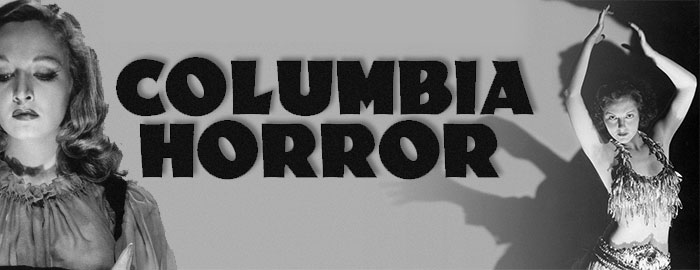
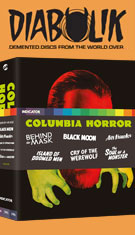

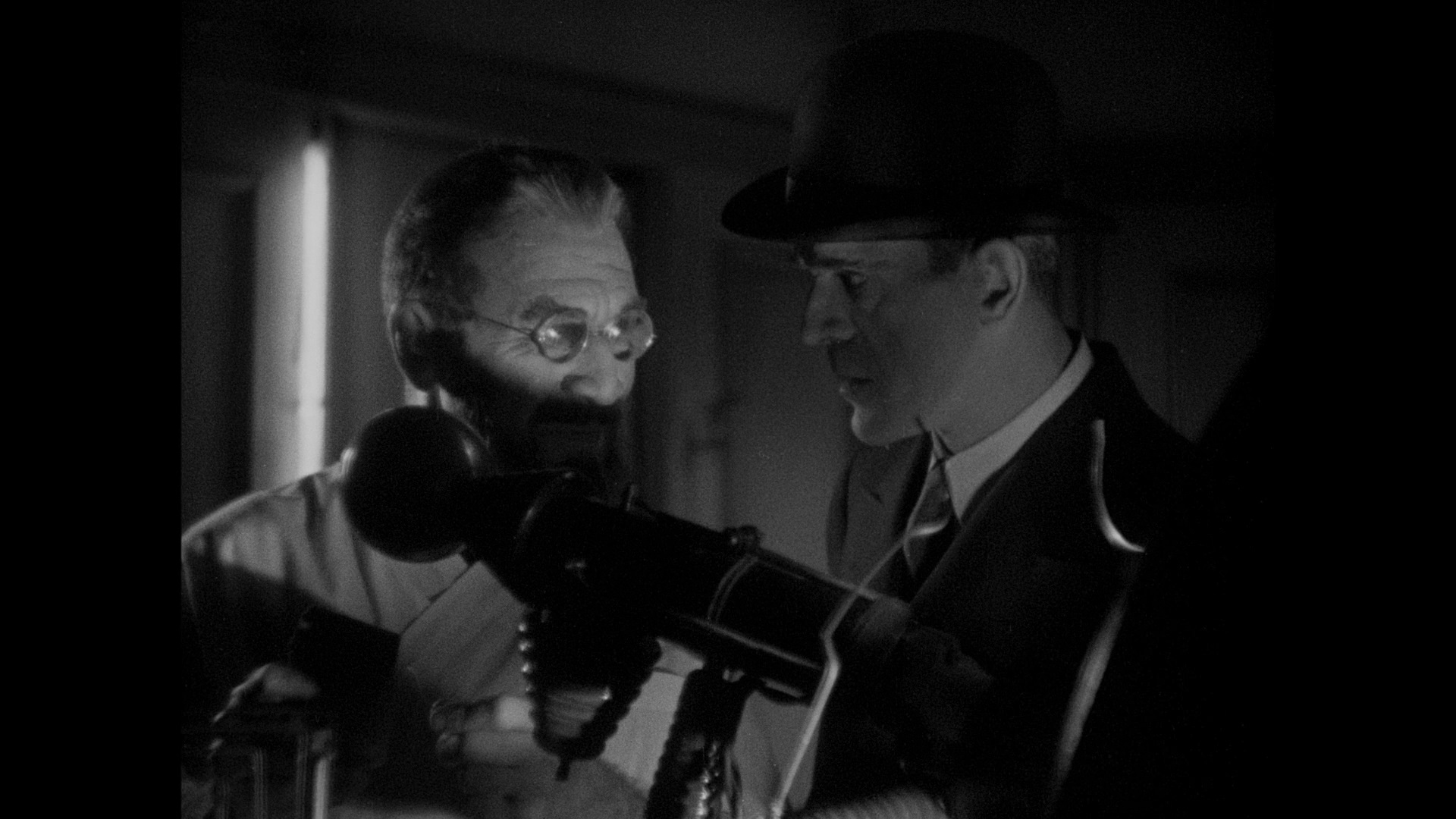 gets quite a strechy workout in the 2024 U.K. Blu-ray set Columbia Horror, a three-disc, six-film salute to the
gets quite a strechy workout in the 2024 U.K. Blu-ray set Columbia Horror, a three-disc, six-film salute to the  onetime poverty row studio's genre-twisting output from the early Pre-Code sound era to the penultimate year of World War II. Most of these have been around on DVD and various TV outlets over the years, but combining them in nice HD scans up to the usual Sony standards makes for a great way to appreciate the studio's offbeat genre contributions during an era largely dominated by Universal with occasional similar entries from the likes of MGM.
onetime poverty row studio's genre-twisting output from the early Pre-Code sound era to the penultimate year of World War II. Most of these have been around on DVD and various TV outlets over the years, but combining them in nice HD scans up to the usual Sony standards makes for a great way to appreciate the studio's offbeat genre contributions during an era largely dominated by Universal with occasional similar entries from the likes of MGM. 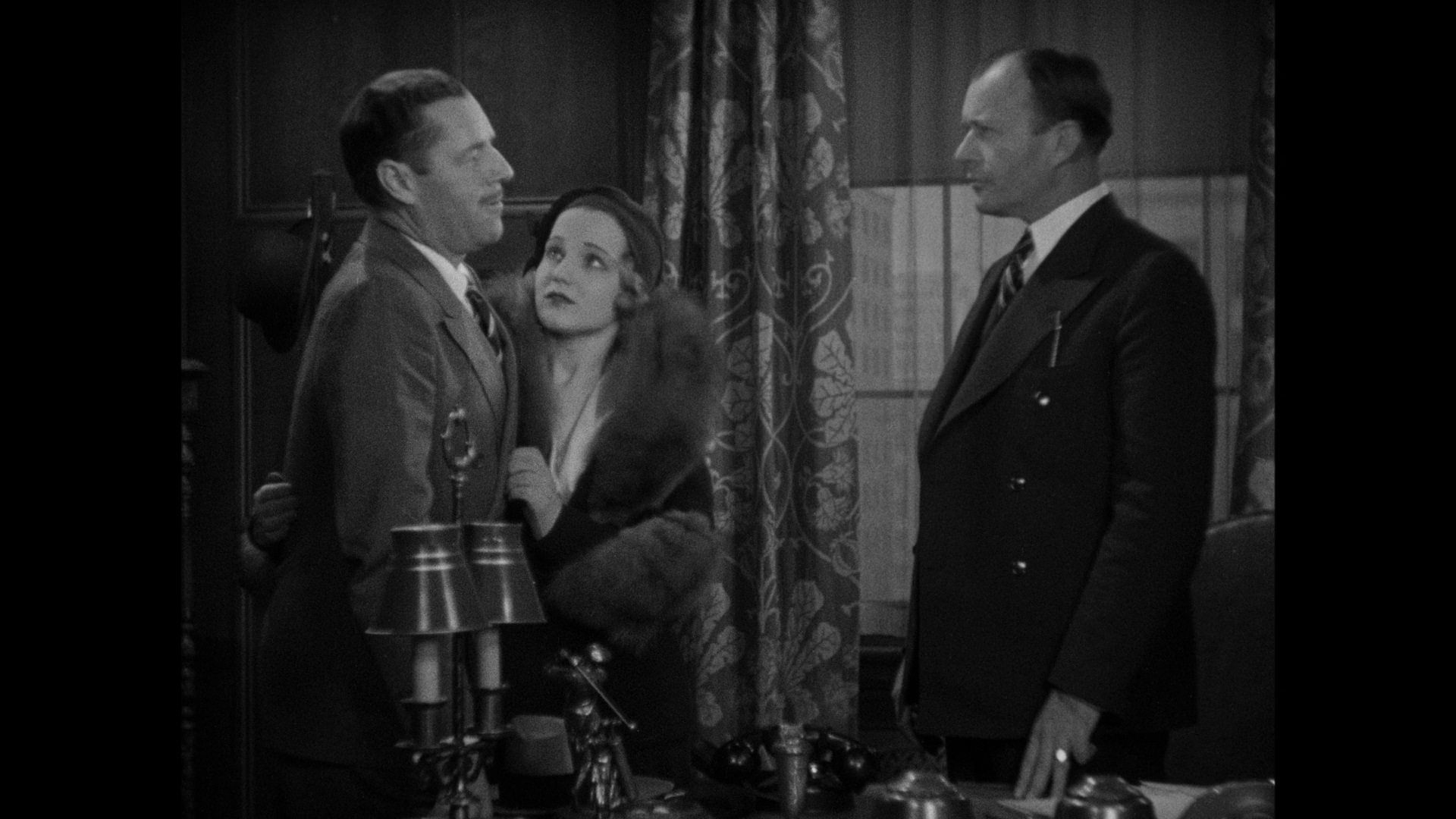 Jim Henderson (Karloff). The man responsible for the whole operation, known only as "X," has killed off
Jim Henderson (Karloff). The man responsible for the whole operation, known only as "X," has killed off 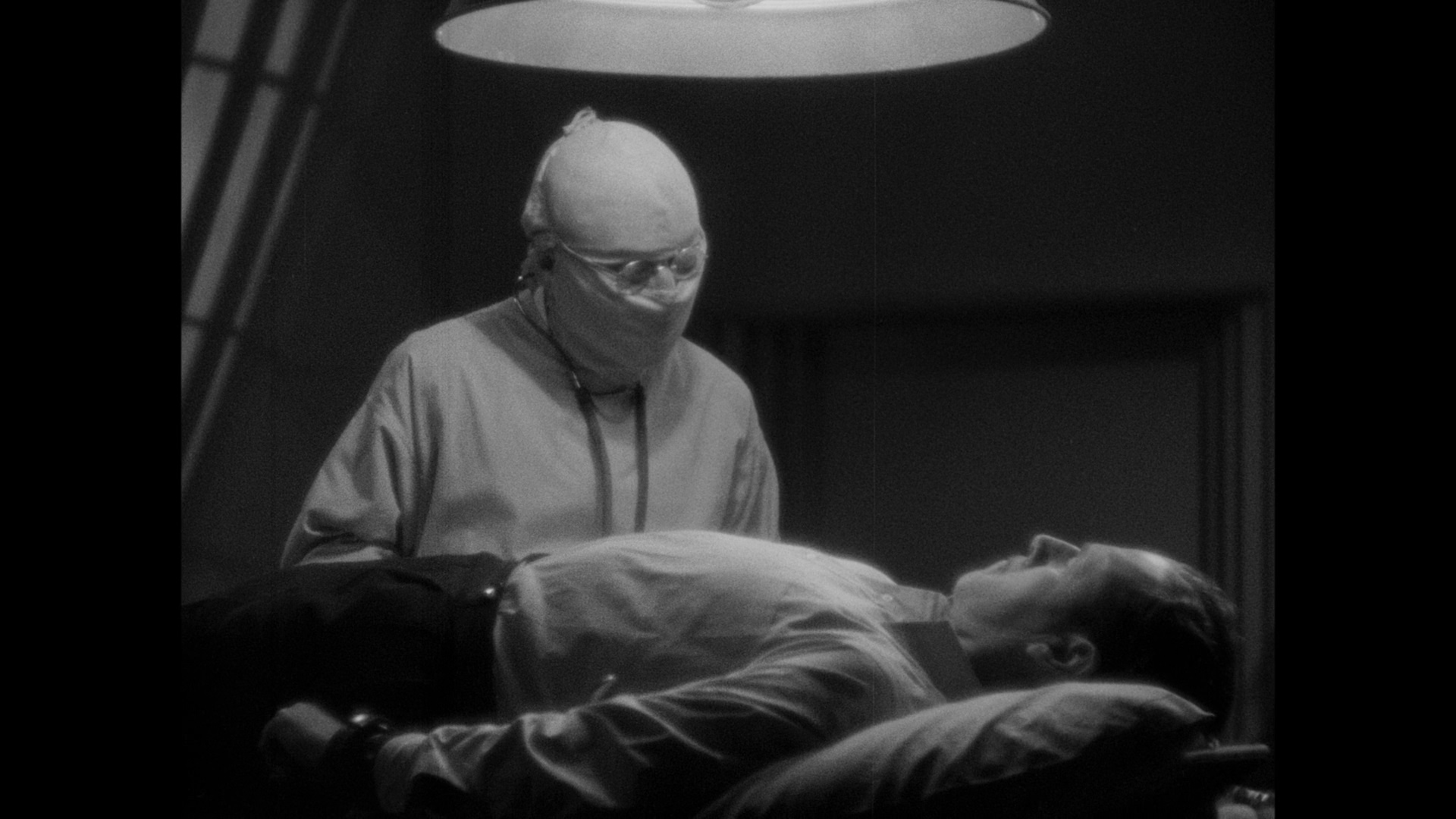 the last four men sent undercover to expose him, and the method he uses to run his drug-smuggling ring makes for the marginal horror content (along with Van Sloan's mad scientist antics in disguise). Much to the distress of girlfriend Julie (Cummings), the latest mole (whose identity should be stupidly obvious even though it isn't revealed until halfway through) gets closer than anyone has before and ends up in danger during a memorable surgical confrontation.
the last four men sent undercover to expose him, and the method he uses to run his drug-smuggling ring makes for the marginal horror content (along with Van Sloan's mad scientist antics in disguise). Much to the distress of girlfriend Julie (Cummings), the latest mole (whose identity should be stupidly obvious even though it isn't revealed until halfway through) gets closer than anyone has before and ends up in danger during a memorable surgical confrontation.  and descriptions of some possibly jettisoned
and descriptions of some possibly jettisoned 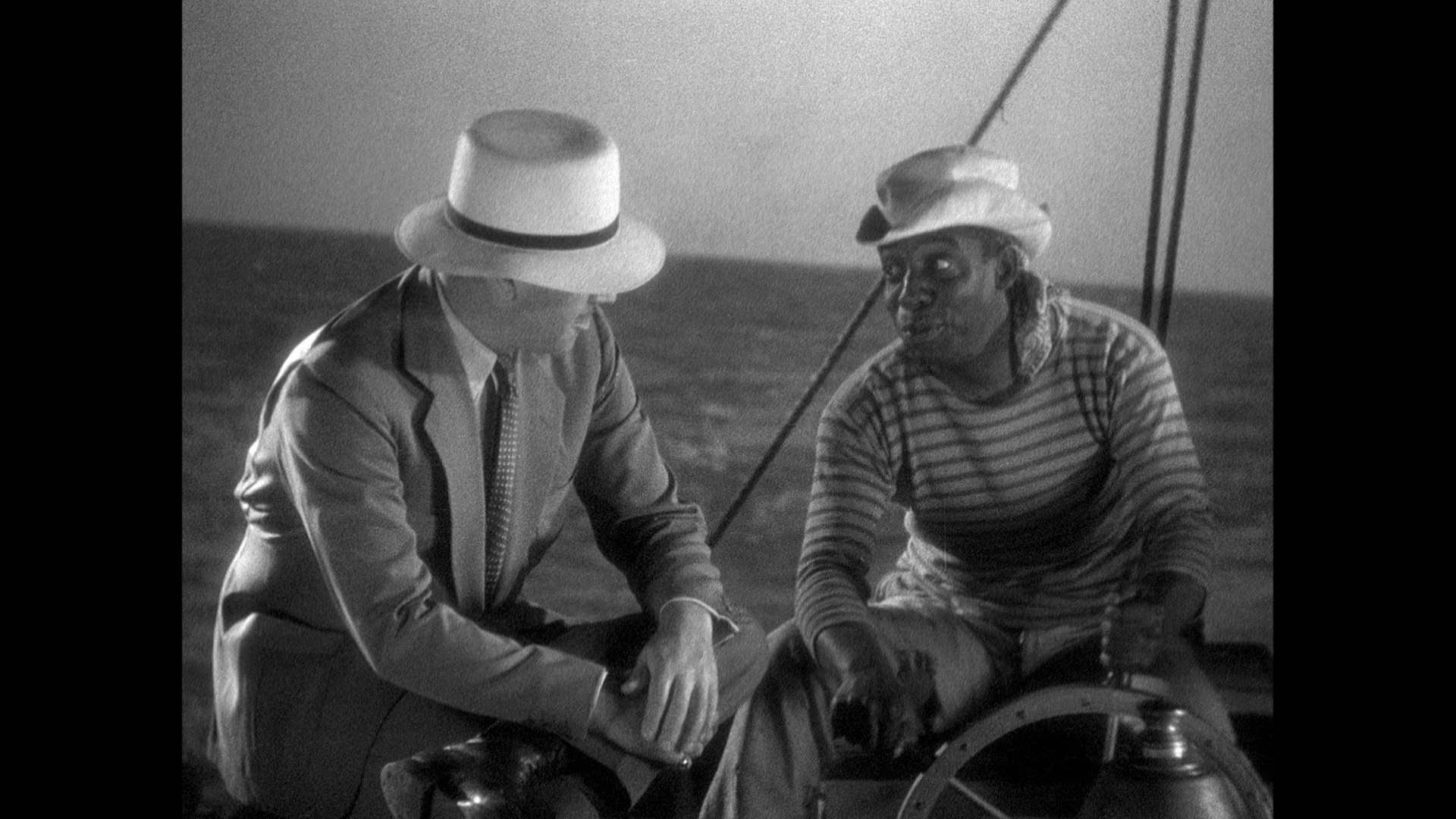 material.
material. be much of a surprise given the subject matter that this is racially dicey material with a depiction of the locals and multiple lines of dialogue bound to cause cringing now, but as a slice of pagan pulp,
be much of a surprise given the subject matter that this is racially dicey material with a depiction of the locals and multiple lines of dialogue bound to cause cringing now, but as a slice of pagan pulp,  it's a fascinating example of how the studio was still dipping its toes into the genre at the tail end of the Pre-Code era. Wray and Holt aren't exactly given their most dynamic material here, with Burgess getting the most intriguing character who probably would have been the protagonist had this been made a couple of decades later. The elements for this one have been kept in fine shape over the years and still look excellent here, while Stephen Jones and Kim Newman provide another sturdy, informative audio commentary exploring the voodoo perceptions and genre usage of the time, context for the more volatile racial material here, the backgrounds for the director and cast, the transitional state of horror around that time, and plenty more. As for the rest of the extras, Behind the Mask comes with "The BEHP Interview with Constance Cummings," a 1997 archival audio recording of the actress in conversation with Roy Fowler, running for the entire duration of the main feature as an alternate track covering her childhood, her entry into acting, and highlights from many of her films over the course of her career including memories of the, ahem, challenging Harry Cohn at Columbia. In "A Gentleman of Leisure" (11m1s), author Sheldon
it's a fascinating example of how the studio was still dipping its toes into the genre at the tail end of the Pre-Code era. Wray and Holt aren't exactly given their most dynamic material here, with Burgess getting the most intriguing character who probably would have been the protagonist had this been made a couple of decades later. The elements for this one have been kept in fine shape over the years and still look excellent here, while Stephen Jones and Kim Newman provide another sturdy, informative audio commentary exploring the voodoo perceptions and genre usage of the time, context for the more volatile racial material here, the backgrounds for the director and cast, the transitional state of horror around that time, and plenty more. As for the rest of the extras, Behind the Mask comes with "The BEHP Interview with Constance Cummings," a 1997 archival audio recording of the actress in conversation with Roy Fowler, running for the entire duration of the main feature as an alternate track covering her childhood, her entry into acting, and highlights from many of her films over the course of her career including memories of the, ahem, challenging Harry Cohn at Columbia. In "A Gentleman of Leisure" (11m1s), author Sheldon  Hall dives into the life story and
Hall dives into the life story and  career of Jack Holt including his entry into Columbia, his brief leading man status, and his subsequent work. Also included are galleries for Behind the Mask (24 images) and Black Moon (28 images).
career of Jack Holt including his entry into Columbia, his brief leading man status, and his subsequent work. Also included are galleries for Behind the Mask (24 images) and Black Moon (28 images). 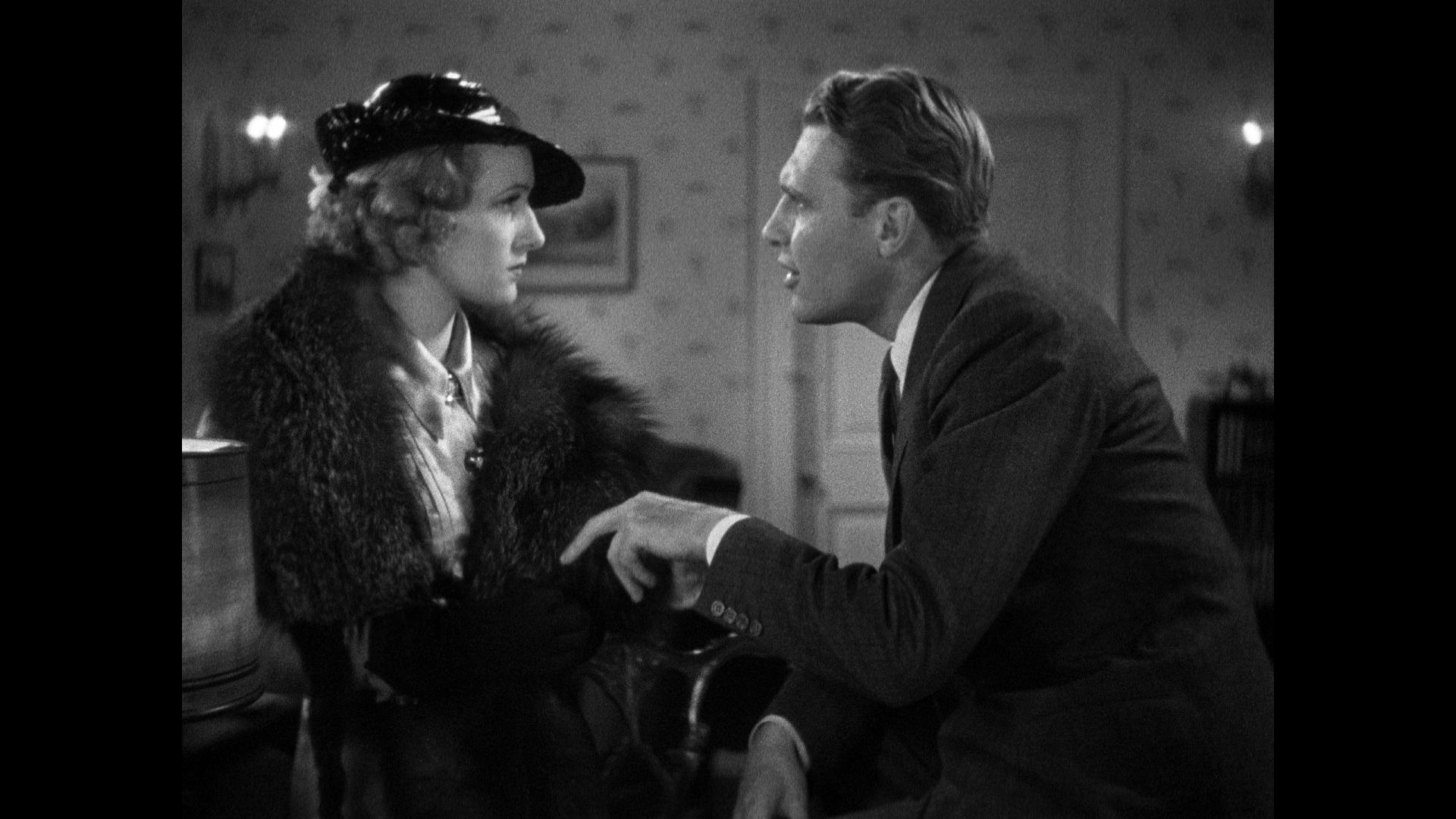 and
and 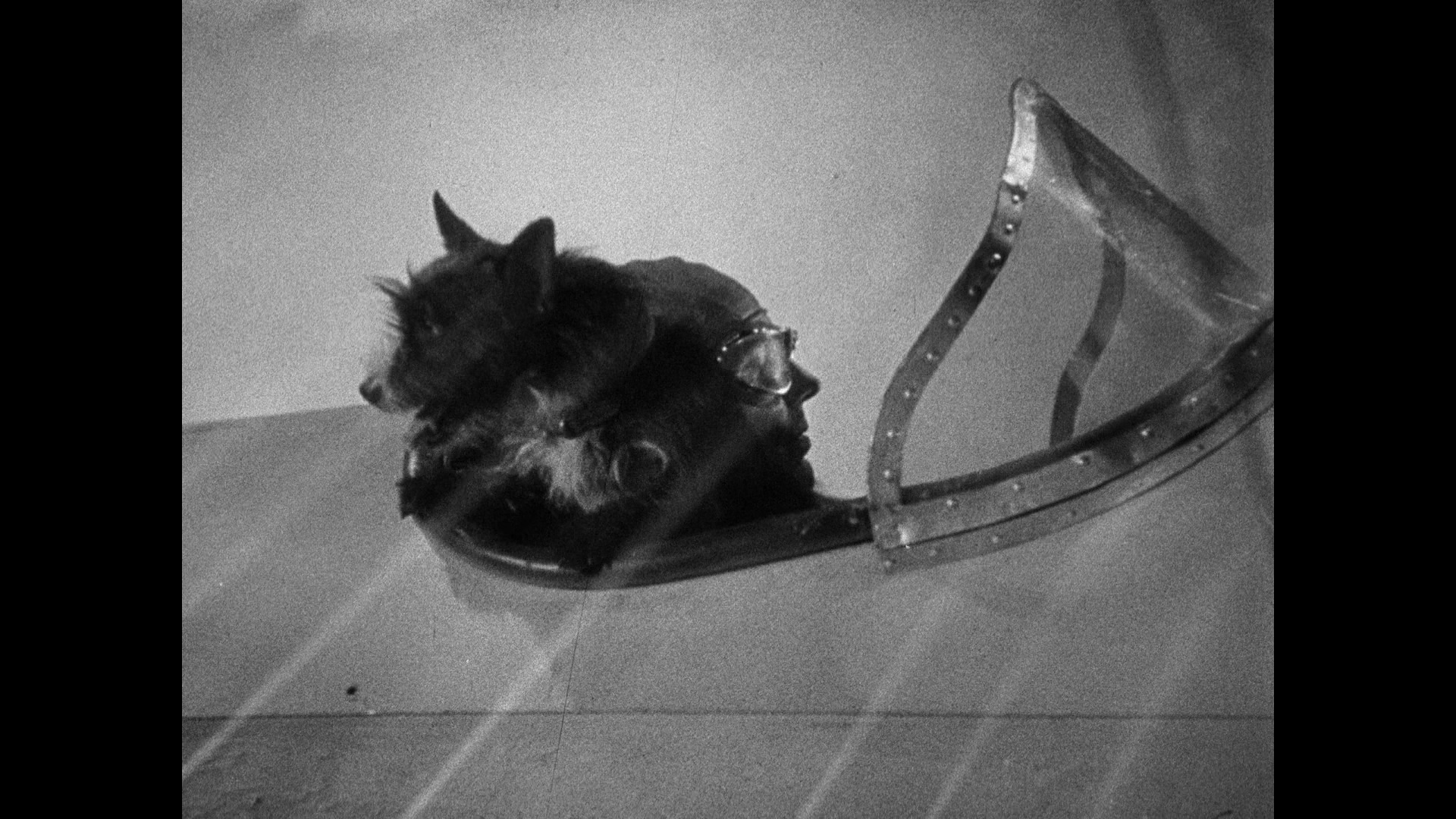 explosions, a plucky dog, an even pluckier plane-crazy kid, an alluring nightclub femme fatale (Birell), and even some dark and stormy night shenanigans to blur the genre lines a little bit. As with all the other films in this set, it clocks in under 70 minutes and wastes little time doling out the the thrills; despite being highly atypical, it wouldn't be surprising if this becomes a fond favorite for many first-time viewers. The element here looks superb (only a few process shots dip in quality), and this is one you can even break out to entertain any misguided horror haters you might know. Frequent TCM writer and film scholar Jeremy Arnold does the commentary honors for this one, sifting through its crazy quilt of crowd-pleasing elements including Post's much-touted participation, the fantastic film connections with that neon-lined ray, the market for B-movies, and connections to other Columbia films of the era.
explosions, a plucky dog, an even pluckier plane-crazy kid, an alluring nightclub femme fatale (Birell), and even some dark and stormy night shenanigans to blur the genre lines a little bit. As with all the other films in this set, it clocks in under 70 minutes and wastes little time doling out the the thrills; despite being highly atypical, it wouldn't be surprising if this becomes a fond favorite for many first-time viewers. The element here looks superb (only a few process shots dip in quality), and this is one you can even break out to entertain any misguided horror haters you might know. Frequent TCM writer and film scholar Jeremy Arnold does the commentary honors for this one, sifting through its crazy quilt of crowd-pleasing elements including Post's much-touted participation, the fantastic film connections with that neon-lined ray, the market for B-movies, and connections to other Columbia films of the era. 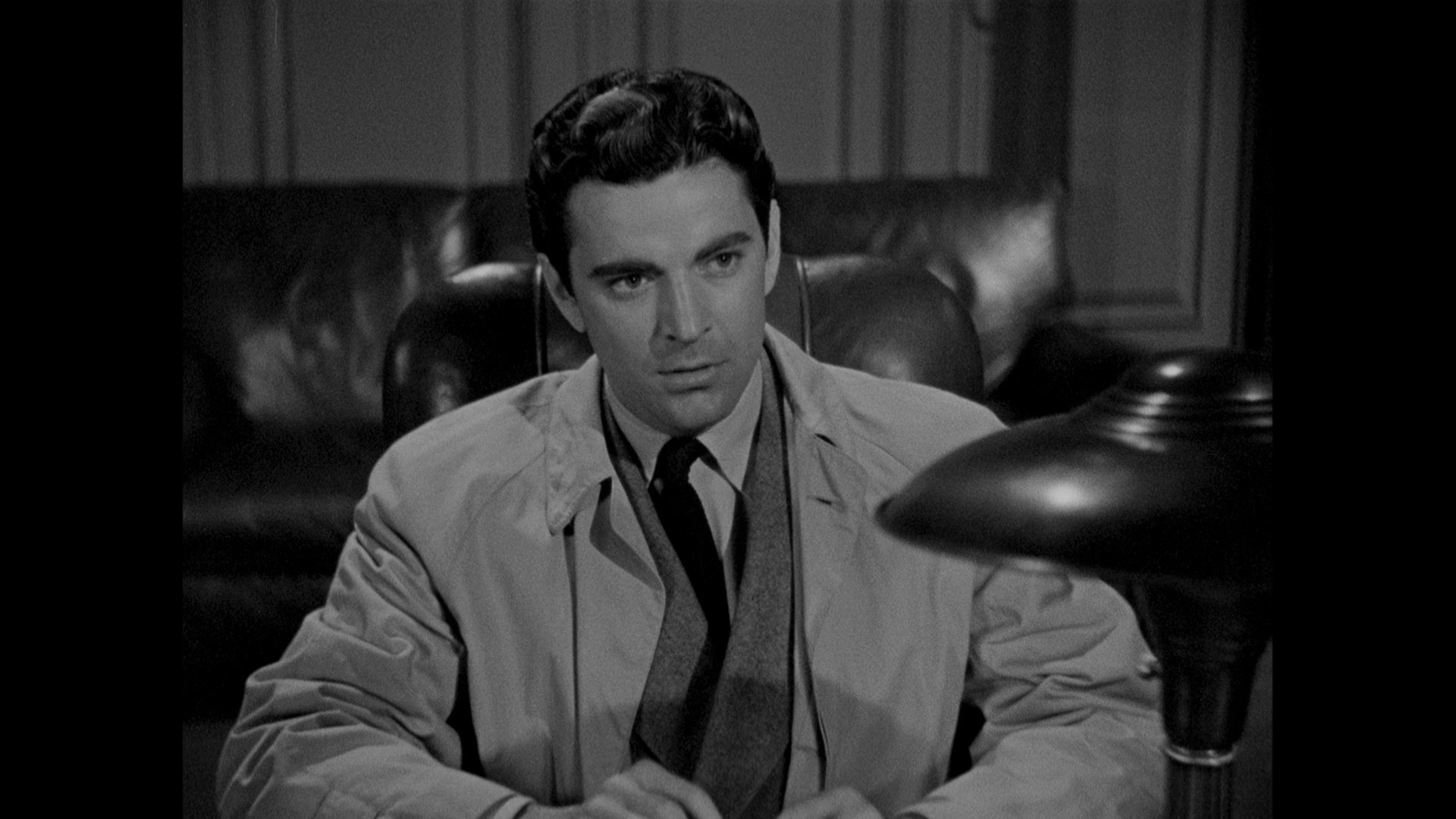 The companion feature
The companion feature  on this disc, the irresistibly titled Island of Doomed Men, turns the spotlight over to the always welcome Peter Lorre, here at his slimiest as a slave laborer overseeing an illegal rock-laden camp off the coast of California (what, on Catalina?) populated by ill-fated parolees. Sent undercover is handsome fed Mark Sheldon (Wilcox), who takes on the persona of the ingeniously named criminal "John Smith" who, after doing a stint of time including hard labor, ends up on the deadly island run by monkey-phobic Stephen Danel (Lorre) and his ambivalent wife, Lorraine (Hudson).
on this disc, the irresistibly titled Island of Doomed Men, turns the spotlight over to the always welcome Peter Lorre, here at his slimiest as a slave laborer overseeing an illegal rock-laden camp off the coast of California (what, on Catalina?) populated by ill-fated parolees. Sent undercover is handsome fed Mark Sheldon (Wilcox), who takes on the persona of the ingeniously named criminal "John Smith" who, after doing a stint of time including hard labor, ends up on the deadly island run by monkey-phobic Stephen Danel (Lorre) and his ambivalent wife, Lorraine (Hudson).  Columbia films for a "Son of Shock" TV syndication package that left its mark on an entire generation of
Columbia films for a "Son of Shock" TV syndication package that left its mark on an entire generation of  viewers. Obviously Lorre is the main attraction here and he doesn't disappoint strutting around in his safari outfit, though Wilcox makes for a solid hero as well and would sadly die very young of a heart attack a few years later. First released on Blu-ray in Australia by Imprint as part of its Essential Film Noir: Collection 5 minus any extras (after an MOD Sony DVD-R), the film looks very satisfying here with lots of moody shadows and crisp outdoor scenes. A new commentary by Alexandra Heller-Nicholas and Josh Nelson gets amusing mileage out of the film's content issues around the world (including on their own Aussie turf) while covering the essentials about Lorre, Columbia creepy noir, the backgrounds of the cast, and the role of masculinity in prison movies. The video extras here include "Darkness of the Morbid Brain" (16m33s) with Jonathan Rigby offering a primer on Lorre starting with reactions to his Hollywood transition role in Mad Love and analyzing his appeal as a popular and highly effective screen presence whose looks and abilities were always handy for creating unusual, fascinating characters. The extremely quick "New York to Berlin in Twenty-Six Hours" (1m17s) is a German 1933 newsreel tidbit about Post's
viewers. Obviously Lorre is the main attraction here and he doesn't disappoint strutting around in his safari outfit, though Wilcox makes for a solid hero as well and would sadly die very young of a heart attack a few years later. First released on Blu-ray in Australia by Imprint as part of its Essential Film Noir: Collection 5 minus any extras (after an MOD Sony DVD-R), the film looks very satisfying here with lots of moody shadows and crisp outdoor scenes. A new commentary by Alexandra Heller-Nicholas and Josh Nelson gets amusing mileage out of the film's content issues around the world (including on their own Aussie turf) while covering the essentials about Lorre, Columbia creepy noir, the backgrounds of the cast, and the role of masculinity in prison movies. The video extras here include "Darkness of the Morbid Brain" (16m33s) with Jonathan Rigby offering a primer on Lorre starting with reactions to his Hollywood transition role in Mad Love and analyzing his appeal as a popular and highly effective screen presence whose looks and abilities were always handy for creating unusual, fascinating characters. The extremely quick "New York to Berlin in Twenty-Six Hours" (1m17s) is a German 1933 newsreel tidbit about Post's  groundbreaking transatlantic flying
groundbreaking transatlantic flying  feat. Also included are galleries for Air Hawks (24 images) and Island of Doomed Men (31 images).
feat. Also included are galleries for Air Hawks (24 images) and Island of Doomed Men (31 images). Though
Though  this has never been cited as anyone's favorite werewolf film by a long shot, this debut for director Henry Levin (who went on to helm some of the Matt Helm films) has some interest as the first real cinematic female werewolf story as well as an early showcase for Foch, who went on to glory with My Name Is Julia Ross, The Ten Commandments, Spartacus, and an Oscar nom for Executive Suite. Crane is pure cardboard here (no surprise he gave up acting after two more films), but the supporting cast is interesting including a small uncredited turn for writer Fritz Leiber. Though it doesn't have much of a legit home video history, this one has turned up on TV with fair frequency including the HD scan here seen on the Sony Movie Channel. The master still holds up well here with plenty of noir-style lighting, covering up for what was a very limited budget. Commentary honors this time are done by Eloise Ross, who fills the hour with a skillful reading of the female aspects of lycanthropy and this film's place in a very diverse cycle of films to come.
this has never been cited as anyone's favorite werewolf film by a long shot, this debut for director Henry Levin (who went on to helm some of the Matt Helm films) has some interest as the first real cinematic female werewolf story as well as an early showcase for Foch, who went on to glory with My Name Is Julia Ross, The Ten Commandments, Spartacus, and an Oscar nom for Executive Suite. Crane is pure cardboard here (no surprise he gave up acting after two more films), but the supporting cast is interesting including a small uncredited turn for writer Fritz Leiber. Though it doesn't have much of a legit home video history, this one has turned up on TV with fair frequency including the HD scan here seen on the Sony Movie Channel. The master still holds up well here with plenty of noir-style lighting, covering up for what was a very limited budget. Commentary honors this time are done by Eloise Ross, who fills the hour with a skillful reading of the female aspects of lycanthropy and this film's place in a very diverse cycle of films to come.  Workmanlike director Will Jason does an okay job with the story of ailing philanthropist Dr. George Winson
Workmanlike director Will Jason does an okay job with the story of ailing philanthropist Dr. George Winson  (Macready), whose rapid decline and imminent death have his desperate wife, Ann (Bates), beseeching any power within earshot to help them. A mysterious woman, Lilyan (Hobart), appears and quickly helps George recover, but in turn he seems to become a different person without any compassion or warmth. On top of that he doesn't seem to have normal vital functions and is under the sway of Lilyan, who has murderous impulses of her own.
(Macready), whose rapid decline and imminent death have his desperate wife, Ann (Bates), beseeching any power within earshot to help them. A mysterious woman, Lilyan (Hobart), appears and quickly helps George recover, but in turn he seems to become a different person without any compassion or warmth. On top of that he doesn't seem to have normal vital functions and is under the sway of Lilyan, who has murderous impulses of her own.  out some standout visual flourishes in this film and his
out some standout visual flourishes in this film and his  later, more ambitious work (including the other two Matt Helm films). "Don’t Kill Your Friends" (14m3s) is a nutty 1943 World War II short film featuring a Dilbert propaganda poster character coming to life and guiding you through a look at the importance of aerial military and workers to the war effort, with Foch turning up in the most violent bit. The disc rounds out with galleries for Cry of the Werewolf (47 images) and The Soul of a Monster (23 images). One of the most impressive aspects of the set is another one of Indicator's insert publications, in this case a thoughtful and extremely thorough 100-page book featuring new and archival writings including "The Woman Who Dared" by Betham Roberts, "Hollywood Makes This Man Appear a Monster" by John C. Moffit, "Only Half Alive" by Ellen Wright, "The Luckiest Girl in Hollywood" by Edith Dietz, "Terror in the Skies" by Sergio Angelini, a report on Posts's death, "Doomed Man" by Paul Duane, an article on actress Rochelle Hudson by Paul Harrison, "Columbia's Unusual Queen of Horror" by Tim Snelson, pressbook material for Cry of the Werewolf, "It's a Cock-Eyed World" and "Rose Hobart v. California" by Jeff Billington, notes on "Don't Kill Your Friends," and tech specs and credits.
later, more ambitious work (including the other two Matt Helm films). "Don’t Kill Your Friends" (14m3s) is a nutty 1943 World War II short film featuring a Dilbert propaganda poster character coming to life and guiding you through a look at the importance of aerial military and workers to the war effort, with Foch turning up in the most violent bit. The disc rounds out with galleries for Cry of the Werewolf (47 images) and The Soul of a Monster (23 images). One of the most impressive aspects of the set is another one of Indicator's insert publications, in this case a thoughtful and extremely thorough 100-page book featuring new and archival writings including "The Woman Who Dared" by Betham Roberts, "Hollywood Makes This Man Appear a Monster" by John C. Moffit, "Only Half Alive" by Ellen Wright, "The Luckiest Girl in Hollywood" by Edith Dietz, "Terror in the Skies" by Sergio Angelini, a report on Posts's death, "Doomed Man" by Paul Duane, an article on actress Rochelle Hudson by Paul Harrison, "Columbia's Unusual Queen of Horror" by Tim Snelson, pressbook material for Cry of the Werewolf, "It's a Cock-Eyed World" and "Rose Hobart v. California" by Jeff Billington, notes on "Don't Kill Your Friends," and tech specs and credits.![]()